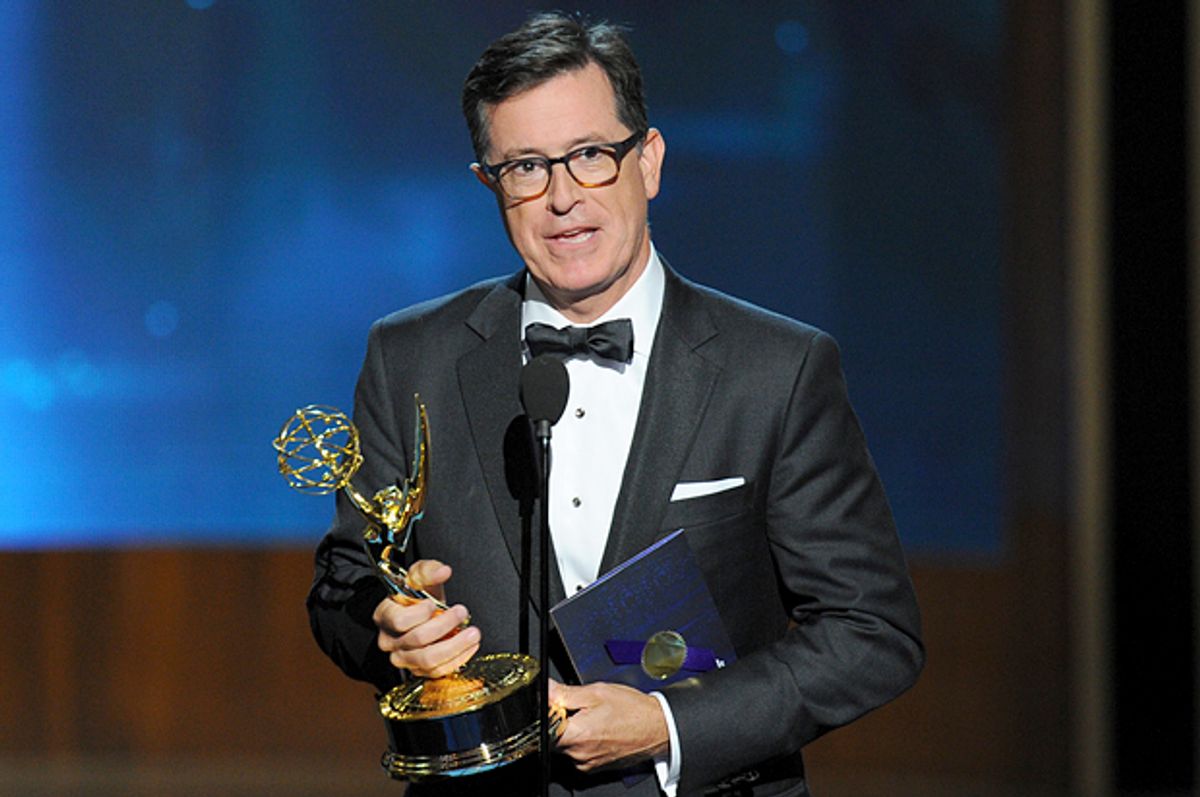Jon Stewart had a 10-year-long winning streak in the Emmys' best variety series category -- and its end, last year, felt long overdue. His "Daily Show" has a loyal legion of fans and will be Comedy Central's flagship as long as it's on the air, but "The Colbert Report" had for several years felt more vital, and its degree of difficulty, with Colbert performing in character, started to seem higher. Little wonder Colbert is now the host building an Emmy winning streak, having scooped the best variety series trophy (effectively a prize honoring late-night TV) last year and this one; as he prepares to take over CBS's "Late Show," it's a moment to feel grateful that he'll be getting a bigger platform, and concerned that he may lose the opportunity to do what makes him noteworthy.
I had presumed that NBC's "Tonight Show," hosted by Jimmy Fallon, would win the Emmy for its sheer novelty, with a new host bringing the franchise into the Internet era with self-consciously potential viral content. But no amount of celebrity games, I ought to have known, could overcome the Emmys' taste for repeating past wins; Colbert was locked in. And his style is as different as could be from Fallon's. As Fallon has moved "Tonight" further and further away from its roots as an interview show, Colbert has spent years indulging the most deliriously verbal comedy on TV, twisting language to its very limit.
Colbert does not, really, go after specific politicians or media figures to the exclusion of broader commentary -- the primary difference between him and Stewart, whose outrage at Fox News or at politicians who don't fulfill some vision of centrism has been tired for years. Instead, his whole bit, from his character's egotism to the glee with which he executes "The Word" segments, mocks the madness of our entire media complex. It's a specific vision, but also expansive enough to have lasted nearly a decade.
Colbert's show is, at once, engaged with the present moment and in its own absurd world. "The Tonight Show" acknowledges the political scene only in weak monologue jokes, but it's not really the content that differentiates the two shows -- it's the approach. Colbert sees the world as one whose complications and strangenesses demand satirizing; Fallon sees the world as one that isn't complicated or strange at all.
The pair are as different in approach as were Jay Leno and David Letterman, but seem to have a healthy friendship free of psychodrama; Colbert allowed Fallon to deliver his speech for him at the Emmys. In the best-case scenario, Colbert will provide network viewers with a genuine alternative to Fallon -- but another scenario is that heading to "The Late Show" will dilute, somewhat, Colbert's ability to deliver systemic analysis. At least CBS's late-night franchise has, since its creation, been the most thinky out there. The network has allowed David Letterman to do whatever he wants for years, and though Colbert will be leaving the "Colbert" character behind, presumably he'll be allowed to be as sharp-edged as he likes.
Colbert is far from perfect -- in the past year, the host came under pressure for a decontextualized tweet sent from his show's account and set himself up as the victim in a way that tested the limits of what it is to be "in character." It had been a misunderstanding, yes, but a simple apology would have sufficed. As a host, he's welcomed historical villain Henry Kissinger to dance on his show; so much for truth to power. And at last night's Emmys, Colbert thanked his "one woman" writer, acknowledging a gender bias issue it wouldn't be too hard to actually rectify.
But as the one host in late night who manages to make the absurdities and indignities of contemporary politics fun -- rather than either ignoring them or wallowing in them -- Colbert is the man of the moment. His Emmy win was timely, and perhaps next year Colbert will bring the best variety series back to network TV. The last network star who won it, indeed, was Colbert's predecessor, and another star who manages to make the frustrating fun: David Letterman.

Shares